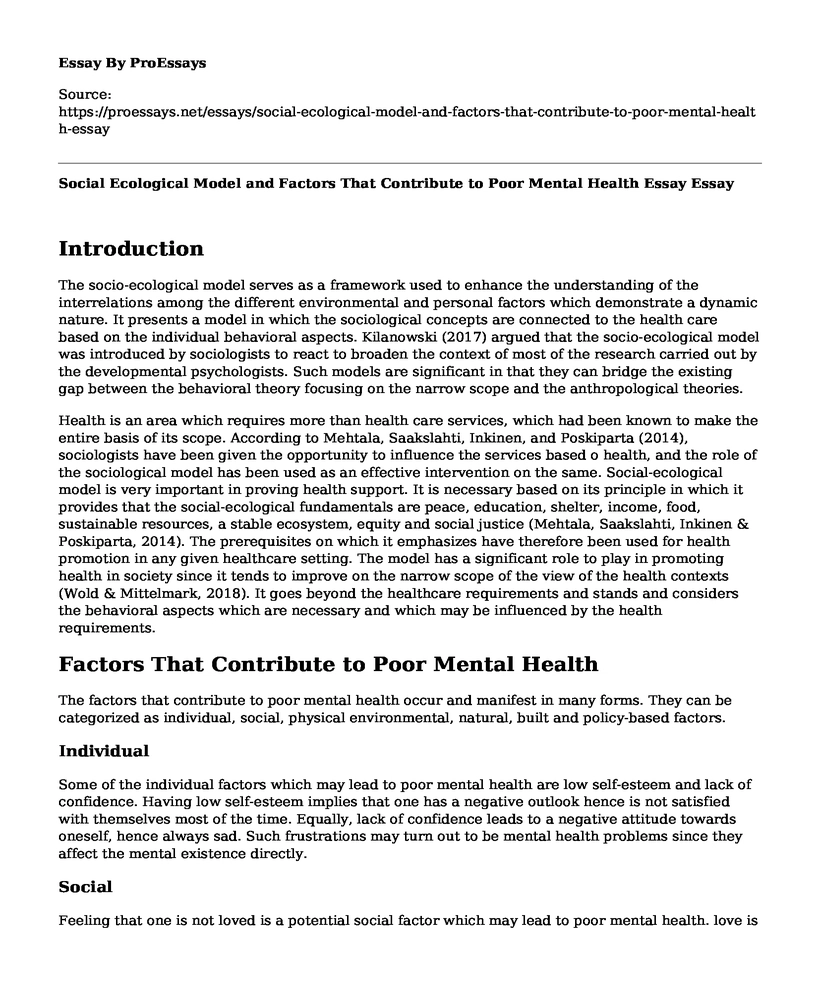Introduction
The socio-ecological model serves as a framework used to enhance the understanding of the interrelations among the different environmental and personal factors which demonstrate a dynamic nature. It presents a model in which the sociological concepts are connected to the health care based on the individual behavioral aspects. Kilanowski (2017) argued that the socio-ecological model was introduced by sociologists to react to broaden the context of most of the research carried out by the developmental psychologists. Such models are significant in that they can bridge the existing gap between the behavioral theory focusing on the narrow scope and the anthropological theories.
Health is an area which requires more than health care services, which had been known to make the entire basis of its scope. According to Mehtala, Saakslahti, Inkinen, and Poskiparta (2014), sociologists have been given the opportunity to influence the services based o health, and the role of the sociological model has been used as an effective intervention on the same. Social-ecological model is very important in proving health support. It is necessary based on its principle in which it provides that the social-ecological fundamentals are peace, education, shelter, income, food, sustainable resources, a stable ecosystem, equity and social justice (Mehtala, Saakslahti, Inkinen & Poskiparta, 2014). The prerequisites on which it emphasizes have therefore been used for health promotion in any given healthcare setting. The model has a significant role to play in promoting health in society since it tends to improve on the narrow scope of the view of the health contexts (Wold & Mittelmark, 2018). It goes beyond the healthcare requirements and stands and considers the behavioral aspects which are necessary and which may be influenced by the health requirements.
Factors That Contribute to Poor Mental Health
The factors that contribute to poor mental health occur and manifest in many forms. They can be categorized as individual, social, physical environmental, natural, built and policy-based factors.
Individual
Some of the individual factors which may lead to poor mental health are low self-esteem and lack of confidence. Having low self-esteem implies that one has a negative outlook hence is not satisfied with themselves most of the time. Equally, lack of confidence leads to a negative attitude towards oneself, hence always sad. Such frustrations may turn out to be mental health problems since they affect the mental existence directly.
Social
Feeling that one is not loved is a potential social factor which may lead to poor mental health. love is necessary for a healthy being on the mental context. However, when one feels that he or she is not loved, leads to a feeling that one is not comfortable and there cannot make relationships with others. The same can be experienced when one loses a family member, who can be a sibling or a parent because of the pin one undergoes through.
Physical Environment
An individual can experience a bad encounter with the physical environment which can interfere with the normal functioning on one's mental condition. An accident, for example, involves injury to sensitive parts of the body like the brain which may consequently lead to an adversely affected mental health of the individual involved.
Natural
The natural factors in this context can be associated with the genetics whereby a child can easily suffer from a mental health disorder if someone related to him or her had once been diagnosed with a similar problem. A similar problem can also be experienced one gets infected after being in contact with substances like toxins.
Built
Built factors concerning mental health sickness are those conditions of the structure of an individual which makes him or she susceptible to such conditions. These factors are described as infrastructural since they describe the forms which further determine how one's mental conditions are influenced.
Policies
Policies of health being of an individual can be associated with some causes of mental disorders. For instance, it can be very difficult to meet the requirements of a health policy. This may subsequently lead to the deteriorations of one's mental health.
References
Kilanowski, J. (2017). The breadth of the socio-ecological model. Journal Of Agromedicine. Doi: 10.1080/1059924x.2017.1358971
Mehtala, M., Saakslahti, A., Inkinen, M., & Poskiparta, M. (2014). A socio-ecological approach to physical activity interventions in childcare: a systematic review. International Journal Of Behavioral Nutrition And Physical Activity, 11(1), 22. Doi: 10.1186/1479-5868-11-22
Wold, B., & Mittelmark, M. (2018). Health-promotion research over three decades: The social-ecological model and challenges in the implementation of interventions. Scandinavian Journal Of Public Health, 46(20_suppl), 20-26. Doi: 10.1177/1403494817743893
Cite this page
Social Ecological Model and Factors That Contribute to Poor Mental Health Essay. (2022, Jul 08). Retrieved from https://proessays.net/essays/social-ecological-model-and-factors-that-contribute-to-poor-mental-health-essay
If you are the original author of this essay and no longer wish to have it published on the ProEssays website, please click below to request its removal:
- Significance of Food Through Personal Experience - Essay Sample
- Essay Sample on the Impact of the Internet in Society
- Essay on the Unrewarded Labor of African Americans: A Trace of Economic History
- Essay Sample on Human Memory Distortions: Challenges in Daily Activities
- Essay on Agriculture Adapts to Climate Change: Innovations and Technologies.
- Essay Sample on Mastering Dialogue: Active Listening & Communication Skills
- Burnout, Coping, Engagement, and Motivators in Medical & Mental Health Careers - Research Paper







